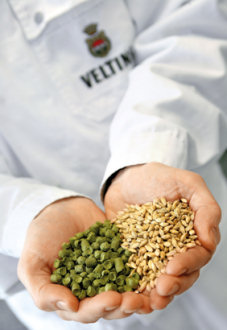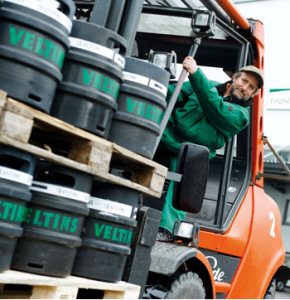 |

|
|

|
|
|
 |

home
about
features
A-Z
books

|

|

Protz:
features
reviews
tastings
|

| |
Veltins Pilsener's push
by Willard Clarke, 11/10
Is there room in British pubs for yet another Pilsener-style German lager? The Veltins Brewery in North-west Germany thinks so. It's planning a major boost for its beer here with an
innovative strategy of targeting the on-trade with draught beer by linking up with regional and smaller British craft brewers.
Veltins Pilsener (4.8%) has been on sale in Britain for 15 years, with sales confined mainly to the Essex area. But now it plans to go national, using the considerable experience of Steve Holt at Vertical Drinks to drive sales with regional "brewing partners". These include Robinson's of Stockport, with its estate of 400 pubs, and such smaller but influential brewers as Butcombe, Oakham, Ossett and Purity. Wholesaler James Clay will handle the free trade, where M&B; sells the beer in 50 All Bar One outlets.
 Veltins is a family-owned company that's been brewing for more than 180 years. It's based in a region of Germany that includes the industrial Ruhr and such major cities as Dusseldorf and Dortmund. There are still thirsty industrial workers to satisfy but also tourists who visit the area for walking, climbing and skiing. The demand for beer in the region is met by such well-known brewers as Krombach and Warsteiner but Veltins is no also-ran. It's one of the Top Ten German breweries, producing 1.5 million barrels a year. Its Pilsener ranks as the fifth biggest brand in the country.
The company has a major share of the lucrative non-alcoholic fruit-flavoured soft drinks sector but Pilsener is its single beer brand: back in 1926 Carl Veltins took the decision to concentrate on that style when a report from the College of Brewing Technology in Berlin reported that the especially soft water from the surrounding mountains was ideal for brewing Pilsener.
Western Germany is just a short-one hour flight from Britain but it's a vastly different beer market. Between 75 and 80% of beer sales there are from the off-trade. Thanks to generously low levels of duty, take-home beer is remarkably cheap and it's sold not by the bottle but the crate. Veltins exports to 30 countries but tackling the British market, where on-trade draught beer accounts for more than half of sales, has been a steep learning curve for the company.
The decision to target Britain is the result of the success of Becks, which has become a mass market brand, allied to the sharp decline in sales of British-brewed lagers. As a result, there's greater interest and demand for German beer here even though the costs of brewing to the famous 16th-century Reinheitsgebot or Purity Law - that permits only malted barley and/or malted wheat, hops, yeast and water to be used - means a pint in Britain costs between �3.50 in the north and �3.80 in London.
Veltins Pilsener has 300 draught installations in Britain and the plan is to double that figure over the next three years. The presence of the beer on British bars should give it a higher profile that will encourage a move into the off-trade in 2011.
Veltins is a family-owned company that's been brewing for more than 180 years. It's based in a region of Germany that includes the industrial Ruhr and such major cities as Dusseldorf and Dortmund. There are still thirsty industrial workers to satisfy but also tourists who visit the area for walking, climbing and skiing. The demand for beer in the region is met by such well-known brewers as Krombach and Warsteiner but Veltins is no also-ran. It's one of the Top Ten German breweries, producing 1.5 million barrels a year. Its Pilsener ranks as the fifth biggest brand in the country.
The company has a major share of the lucrative non-alcoholic fruit-flavoured soft drinks sector but Pilsener is its single beer brand: back in 1926 Carl Veltins took the decision to concentrate on that style when a report from the College of Brewing Technology in Berlin reported that the especially soft water from the surrounding mountains was ideal for brewing Pilsener.
Western Germany is just a short-one hour flight from Britain but it's a vastly different beer market. Between 75 and 80% of beer sales there are from the off-trade. Thanks to generously low levels of duty, take-home beer is remarkably cheap and it's sold not by the bottle but the crate. Veltins exports to 30 countries but tackling the British market, where on-trade draught beer accounts for more than half of sales, has been a steep learning curve for the company.
The decision to target Britain is the result of the success of Becks, which has become a mass market brand, allied to the sharp decline in sales of British-brewed lagers. As a result, there's greater interest and demand for German beer here even though the costs of brewing to the famous 16th-century Reinheitsgebot or Purity Law - that permits only malted barley and/or malted wheat, hops, yeast and water to be used - means a pint in Britain costs between �3.50 in the north and �3.80 in London.
Veltins Pilsener has 300 draught installations in Britain and the plan is to double that figure over the next three years. The presence of the beer on British bars should give it a higher profile that will encourage a move into the off-trade in 2011.
 The Pilsener should stand out from the crowd due to the fact that the draught version is not pasteurised. This demands a quick turnover but the result is beer with a fine fresh aroma and flavour. It will appeal in particular to drinkers of both ale and lager who enjoy hop bitterness. In the North German tradition, Veltins uses a generous amount of hops from the Hallertau region of Bavaria and the result is a beer with a rich toasted malt and bitter hop character, with a delicious hint of citrus fruit.
The beer is brewed with meticulous care and attention to detail. A modern, 1980s Steinecker brewhouse is based on a mash mixer and lauter tun (filtration vessel) system. Surprisingly, Veltins uses an infusion mash rather than the decoction method favoured by most lager brewers in Germany. Infusion mash is widely used by ale brewers: malt and pure water are blended in a mash tun or mixer and natural enzymes turn malt starch into sugar. With a decoction mash, using "poorly modified" malt in which starch needs greater processing to become malt sugar, a portion of the mash is pumped to a second vessel, heated to a higher temperature, then returned to the first vessel. This raises the temperature of the whole mash and encourages a conversion of starch to sugar and the removal of unwanted protein.
At Veltins, following the boil with hops in four brew kettles, the hopped wort undergoes a system of fermentation that I've not encountered before. The liquid goes first into what are called floater tanks, where it's mixed with yeast, which encourages a build up of natural carbon dioxide. After 24 hours, 80% of the fermenting liquid is run off while the remaining 20% is mixed with fresh hopped wort. This is repeated for four days until the tanks are emptied and cleaned.
The system ensures consistency of flavour and quality: the brewers claim that one bottle of their Pilsener will be made up of 200 different brews.
Following the floater tanks, the beer has a rapid two-day fermentation in conical vessels followed by a minimum of four weeks maturation in lager or storage tanks.
Veltins is enjoying considerable success in its home market. Sales of draught beer are up 1.9% this year while bottled beer has increased by an impressive 7.9%. The management said the increase in sales was driven by Germany's good run in the World Cup, not perhaps the most sensitive point to make to a visiting Brit who has yet to forget England's humbling at the hands of Germany.
Veltins is heavily involved in sport. It sponsors FC Schalke in the top football division, the Bundesliga, and also sponsors the Porsche racing team. Schalke has had a poor start to the new season and is close to the bottom of the league. This, Veltins says, makes supporters drink more beer rather than less - surely a recipe for success in Britain
The Pilsener should stand out from the crowd due to the fact that the draught version is not pasteurised. This demands a quick turnover but the result is beer with a fine fresh aroma and flavour. It will appeal in particular to drinkers of both ale and lager who enjoy hop bitterness. In the North German tradition, Veltins uses a generous amount of hops from the Hallertau region of Bavaria and the result is a beer with a rich toasted malt and bitter hop character, with a delicious hint of citrus fruit.
The beer is brewed with meticulous care and attention to detail. A modern, 1980s Steinecker brewhouse is based on a mash mixer and lauter tun (filtration vessel) system. Surprisingly, Veltins uses an infusion mash rather than the decoction method favoured by most lager brewers in Germany. Infusion mash is widely used by ale brewers: malt and pure water are blended in a mash tun or mixer and natural enzymes turn malt starch into sugar. With a decoction mash, using "poorly modified" malt in which starch needs greater processing to become malt sugar, a portion of the mash is pumped to a second vessel, heated to a higher temperature, then returned to the first vessel. This raises the temperature of the whole mash and encourages a conversion of starch to sugar and the removal of unwanted protein.
At Veltins, following the boil with hops in four brew kettles, the hopped wort undergoes a system of fermentation that I've not encountered before. The liquid goes first into what are called floater tanks, where it's mixed with yeast, which encourages a build up of natural carbon dioxide. After 24 hours, 80% of the fermenting liquid is run off while the remaining 20% is mixed with fresh hopped wort. This is repeated for four days until the tanks are emptied and cleaned.
The system ensures consistency of flavour and quality: the brewers claim that one bottle of their Pilsener will be made up of 200 different brews.
Following the floater tanks, the beer has a rapid two-day fermentation in conical vessels followed by a minimum of four weeks maturation in lager or storage tanks.
Veltins is enjoying considerable success in its home market. Sales of draught beer are up 1.9% this year while bottled beer has increased by an impressive 7.9%. The management said the increase in sales was driven by Germany's good run in the World Cup, not perhaps the most sensitive point to make to a visiting Brit who has yet to forget England's humbling at the hands of Germany.
Veltins is heavily involved in sport. It sponsors FC Schalke in the top football division, the Bundesliga, and also sponsors the Porsche racing team. Schalke has had a poor start to the new season and is close to the bottom of the league. This, Veltins says, makes supporters drink more beer rather than less - surely a recipe for success in Britain
|
|
home
about
features
A-Z
books
|

